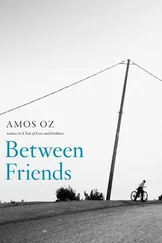Robert Chambers - Between Friends
Здесь есть возможность читать онлайн «Robert Chambers - Between Friends» — ознакомительный отрывок электронной книги совершенно бесплатно, а после прочтения отрывка купить полную версию. В некоторых случаях можно слушать аудио, скачать через торрент в формате fb2 и присутствует краткое содержание. Жанр: foreign_prose, foreign_antique, на английском языке. Описание произведения, (предисловие) а так же отзывы посетителей доступны на портале библиотеки ЛибКат.
- Название:Between Friends
- Автор:
- Жанр:
- Год:неизвестен
- ISBN:нет данных
- Рейтинг книги:3 / 5. Голосов: 1
-
Избранное:Добавить в избранное
- Отзывы:
-
Ваша оценка:
- 60
- 1
- 2
- 3
- 4
- 5
Between Friends: краткое содержание, описание и аннотация
Предлагаем к чтению аннотацию, описание, краткое содержание или предисловие (зависит от того, что написал сам автор книги «Between Friends»). Если вы не нашли необходимую информацию о книге — напишите в комментариях, мы постараемся отыскать её.
Between Friends — читать онлайн ознакомительный отрывок
Ниже представлен текст книги, разбитый по страницам. Система сохранения места последней прочитанной страницы, позволяет с удобством читать онлайн бесплатно книгу «Between Friends», без необходимости каждый раз заново искать на чём Вы остановились. Поставьте закладку, и сможете в любой момент перейти на страницу, на которой закончили чтение.
Интервал:
Закладка:
“Why should I?” he replied, preoccupied.
“It’s bad for you not to. Besides, you are growing thin.”
“Is that your final conclusion concerning me, Cecile?” he asked, absently.
“Won’t you please take this sandwich?”
Her outstretched arm more than what she said arrested his drifting attention again.
“Why the devil do you want me to eat?” he inquired, fishing out his empty pipe and filling it.
“You smoke too much. It’s bad for you. It will do very queer things to the lining of your stomach if you smoke your luncheon instead of eating it.”
He yawned.
“Is that so?” he said.
“Certainly it’s so. Please take this sandwich.”
He stood looking at the outstretched arm, thinking of other things and the girl sprang to her feet, caught his hand, opened the fingers, placed the sandwich on the palm, then, with a short laugh as though slightly disconcerted by her own audacity, she snatched the pipe from his left hand and tossed it upon the table. When she had reseated herself on the lounge beside her pasteboard box of luncheon, she became even more uncertain concerning the result of what she had done, and began to view with rising alarm the steady gray eyes that were so silently inspecting her.
But after a moment Drene walked over to the sofa, seated himself, curiously scrutinized the sandwich which lay across the palm of his hand, then gravely tasted it.
“This will doubtless give me indigestion,” he remarked. “Why, Cecile, do you squander your wages on nourishment for me?”
“It cost only five cents.”
“But why present five cents to me?” “I gave ten to a beggar this morning.”
“Why?”
“I don’t know.”
“Was he grateful?”
“He seemed to be.”
“This sandwich is excellent; but if I feel the worse for it, I’ll not be very grateful to you.” But he continued eating.
“‘The woman tempted me,’” she quoted, glancing at him sideways.
After a moment’s survey of her:
“You’re one of those bright, saucy, pretty, inexplicable things that throng this town and occasionally flit through this profession—aren’t you?”
“Am I?”
“Yes. Nobody looks for anything except mediocrity; you’re one of the surprises. Nobody expects you; nobody can account for you, but you appear now and then, here and there, anywhere, even everywhere—a pretty sparkle against the gray monotony of life, a momentary flash like a golden moat afloat in sunshine—and what then?”
She laughed.
“What then? What becomes of you? Where do you go? What do you turn into?”
“I don’t know.”
“You go somewhere, don’t you? You change into something, don’t you? What happens to you, petite Cigale?”
“When?”
“When the sunshine is turned off and the snow comes.”
“I don’t know, Mr. Drene.” She broke her chocolate cake into halves and laid one on his knee.
“Thanks for further temptation,” he said grimly.
“You are welcome. It’s good, isn’t it?”
“Excellent. Adam liked the apple, too. But it raised hell with him.”
She laughed, shot a direct glance at him, and began to nibble her cake, with her eyes still fixed on him.
Once or twice he encountered her gaze but his own always wandered absently elsewhere.
“You think a great deal, don’t you?” she remarked.
“Don’t you?”
“I try not to—too much.”
“What?” he asked, swallowing the last morsel of cake.
She shrugged her shoulders:
“What’s the advantage of thinking?”
He considered her reply for a moment, her blue and rather childish eyes, and the very pure oval of her face. Then his attention flagged as usual—was wandering—when she sighed, very lightly, so that he scarcely heard it—merely noticed it sufficiently to conclude that, as usual, there was the inevitable hard luck story afloat in her vicinity, and that he lacked the interest to listen to it.
“Thinking,” she said, “is a luxury to a tranquil mind and a punishment to a troubled one. So I try not to.”
It was a moment or two before it occurred to him that the girl had uttered an unconscious epigram.
“It sounded like somebody—probably Montaigne. Was it?” he inquired.
“I don’t know what you mean.”
“Oh. Then it wasn’t. You’re a funny little girl, aren’t you?”
“Yes, rather.”
“On purpose?”
“Yes, sometimes.”
He looked into her very clear eyes, now brightly blue with intelligent perception of his not too civil badinage.
“And sometimes,” he went on, “you’re funny when you don’t intend to be.”
“You are, too, Mr. Drene.”
“What?”
“Didn’t you know it?”
A dull color tinted his cheek bones.
“No,” he said, “I didn’t know it.”
“But you are. For instance, you don’t walk; you stalk. You do what novelists make their gloomy heroes do—you stride. It’s rather funny.”
“Really. And do you find my movements comic?”
She was a trifle scared, now, but she laughed her breathless, youthful laugh:
“You are really very dramatic—a perfect story-book man. But, you know, sometimes they are funny when the author doesn’t intend them to be.... Please don’t be angry.”
Why the impudence of a model should have irritated him he was at a loss to understand—unless there lurked under that impudence a trace of unflattering truth.
As he sat looking at her, all at once, and in an unexpected flash of self-illumination, he realized that habit had made of him an actor; that for a while—a long while—a space of time he could not at the moment conveniently compute—he had been playing a role merely because he had become accustomed to it.
Disaster had cast him for a part. For a long while he had been that part. Now he was still playing it from sheer force of habit. His tragedy had really become only the shadow of a memory. Already he had emerged from that shadow into the everyday outer world. But he had forgotten that he still wore a somber makeup and costume which in the sunshine might appear grotesque. No wonder the world thought him funny.
Glancing up from a perplexed and chagrined meditation he caught her eye—and found it penitent, troubled, and anxious.
“You’re quite right,” he said, smiling easily and naturally; “I am unintentionally funny. And I really didn’t know it—didn’t suspect it—until this moment.”
“Oh,” she said quickly. “I didn’t mean—I know you are often unhappy—”
“Nonsense!”
“You are! Anybody can see—and you really do not seem to be very old, either—when you smile—”
“I’m not very old,” he said, amused. “I’m not unhappy, either. If I ever was, the truth is that I’ve almost forgotten by this time what it was all about—”
“A woman,” she quoted, “between friends”—and checked herself, frightened that she had dared interpret Quair’s malice.
He changed countenance at that; the dull red of anger clouded his visage.
“Oh,” she faltered, “I was not saucy, only sorry.... I have been sorry for you so long—”
“Who intimated to you that a woman ever played any part in my career?”
“It’s generally supposed. I don’t know anything more than that. But I’ve been—sorry. Love is a very dreadful thing,” she said under her breath.
“Is it?” he asked, controlling a sudden desire to laugh.
“Don’t you think so?”
“I have not thought of it that way, recently.... I haven’t thought about it at all—for some years.... Have you?” he added, trying to speak gravely.
“Oh, yes. I have thought of it,” she admitted.
“And you conclude it to be a rather dreadful business?”
Читать дальшеИнтервал:
Закладка:
Похожие книги на «Between Friends»
Представляем Вашему вниманию похожие книги на «Between Friends» списком для выбора. Мы отобрали схожую по названию и смыслу литературу в надежде предоставить читателям больше вариантов отыскать новые, интересные, ещё непрочитанные произведения.
Обсуждение, отзывы о книге «Between Friends» и просто собственные мнения читателей. Оставьте ваши комментарии, напишите, что Вы думаете о произведении, его смысле или главных героях. Укажите что конкретно понравилось, а что нет, и почему Вы так считаете.












